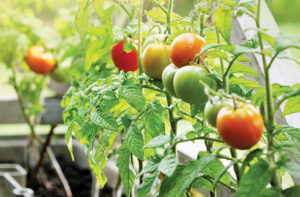Spring is in the air, so it’s time to begin turning your dreams of the flavors of home gardening into a beautiful reality. Flower and garden stores are open and operating in Maine for curbside pick-up and in some cases, in-store shopping. A call ahead is always recommended.
For a new vegetable and fruit garden, a good plan will get you the best results and it’s okay to start small if you’re diving into a new project.
Terry Skillin, president of Skillin’s Greenhouses said, “A lot of people have never vegetable gardened before and there’s a good chance their parents or grandparents didn’t garden. So we’re trying to help people focus on something they know they can sustain and maintain.”
For a backyard (or front yard) vegetable garden you’ll need lots of sun, good drainage and easy access to water, says Melissa Emerson, owner of Pinetree Garden Seeds in New Gloucester.
“A key factor when sowing seeds directly in the soil or indoors is keeping the soil moist, like a wrung-out sponge, not soggy,” according to Pinetree’s 2020 Planting Guide. Rows planted north to south will offer the best sun exposure.
In planning your garden, consider companion planting. For example, dill and basil among tomatoes can protect them from pests and sage in the cabbage patch reduces the number of cabbage moths. Beware fruits and vegetables who are enemies, however! Frame It All, a modular gardening supply company, has excellent resources for all aspects of gardening, including a “Plant Friend and Enemies” chart.
For beginning growers, Emerson recommends salad greens, radishes, peas, zucchini and summer squash because they are hardy and easy to grow.
“Lettuce and hardy greens are fun because you can do them as succession plantings every couple of weeks, so you have fresh lettuce throughout the season,” Emerson said.
She recommends starting tomato, eggplant and cucumber seeds inside or buying seedlings. These plants are tougher to grow in Maine’s short season, she said.

“A fresh garden tomato is the epitome of summer, but there are not enough of the really long, warm days they need.”
These seeds should be sown inside six to eight weeks before they are transplanted outside, she said.
And when choosing seeds, you have options. Heirloom seeds are open-pollinated as opposed to cross-pollinated hybrids.
“Heirlooms are bred for flavor, but they are less disease-resistant. Hybrids are bred to be consistent, high-yielding and uniform, what the market wants,” Emerson said. “Hybrids are not (genetically modified). There’s still confusion in the world about that.”
Debbie Davis-Robinson of Farmington is now a veteran backyard gardener, but she started small, with two raised beds. Her backyard was “good, old-fashioned New England pasture,” she said. “It took a few years to get the soil built up.”
It also took a bit of good, old-fashioned Yankee ingenuity.
She and her husband, Richard, used cattle gates to make hoops for the pole beans and cucumbers so they wouldn’t spread and eat up space. “We try to maximize the space,” Davis-Robinson said.
They now plant six to eight beds, including spinach, Swiss chard and lettuce, beets, carrots, garlic, leeks, pole beans and cucumbers. Tomatoes are grown outside the beds because they take too much space, she said.
She said she has to be watchful because raised beds dry out more quickly than level beds. She uses a sprinkler or soaker hoses.
Despite the work involved, a garden offers rewards. “The good thing about growing veggies is that you can share with neighbors and food pantries,” she said.

For those with poor soil or who want to fill raised beds with rich soil, landscapers will deliver to you, says Tyler Gammon, manager of Gammon Landscape Nursery in Auburn.
“We’ll fill existing boxes with manure and loam or whatever the customer wants,” he said. He recommends the “leafy stuff” for backyard growers.
“A lot of times you see gardeners plant a bunch of tomatoes and peppers and they end up with way too many to use, and they’re not ready until the end of the season,” he said. “Lettuce and spinach you can grow all year, and save money. They’re really expensive to buy.”
Asparagus is a good choice also, he said. “It’s one of the very few vegetables that are perennial, a one-time investment. It comes back each year — and it’s good for you.” However, asparagus seed takes at least three years to return an edible spear.
Gammon also recommends herbs. They are perennial, which means you plant them once and they come back each year. In addition to using them in the kitchen, they can deter rodents and pests. The best herbs for that are lemon thyme, lemon balm and lemongrass, he said. “Groundhogs and bunnies don’t like the lemony scent.”
To deter mosquitoes and other flying pests, he recommends citronella. Marigolds, though not edible, are good to pair with any vegetable. “They attract nematodes to the soil that will eat spider mites and aphids,” he said.

Comments are not available on this story. Read more about why we allow commenting on some stories and not on others.
We believe it's important to offer commenting on certain stories as a benefit to our readers. At its best, our comments sections can be a productive platform for readers to engage with our journalism, offer thoughts on coverage and issues, and drive conversation in a respectful, solutions-based way. It's a form of open discourse that can be useful to our community, public officials, journalists and others.
We do not enable comments on everything — exceptions include most crime stories, and coverage involving personal tragedy or sensitive issues that invite personal attacks instead of thoughtful discussion.
You can read more here about our commenting policy and terms of use. More information is also found on our FAQs.
Show less